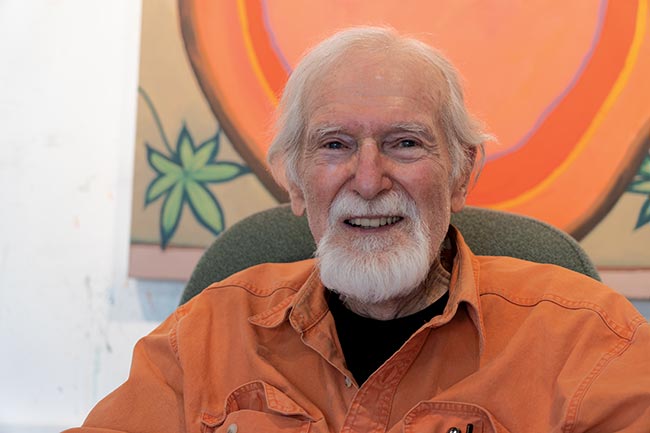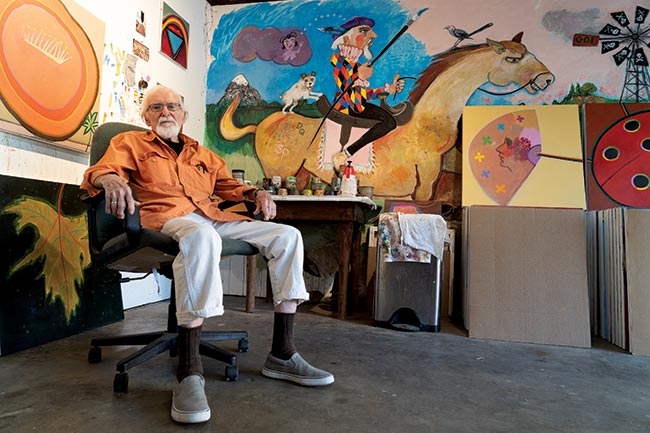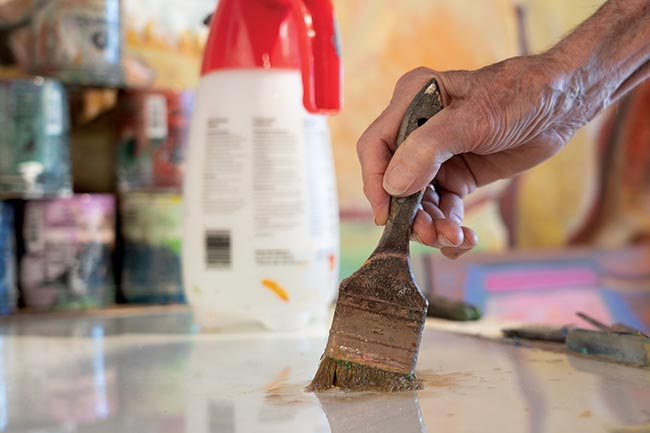The family business: Father, 90, famous son team up for reading Saturday

By Lisa Butterworth
Canvases, brushes, and palettes piled with color aren’t the only things you’ll find in painter Richard Brown Lethem’s Claremont studio. Not far from a colorful work-in-progress is a small collection of leaves and tiny feathers, secured to the wall with masking tape. Nestled among the tubes of acrylic paint and tins of oil pastels are seed pods, pine cones, and even part of what looks to be an old wasps’ nest. Lethem has collected these bits of nature since moving to Claremont from Maine in 2020, and they are inspiring his latest paintings too.
At 90 years old, the artist is experiencing one of his most prolific chapters yet, and is still achieving milestones: his first book of poetry, “Roots, Stones, and Baggage” was just published by Bamboo Dart Press.

Richard Brown Lethem in his Claremont studio Tuesday. His painting, “Don Quixote Goes West,” is pictured behind him. Courier photo/Andrew Alonzo
Lethem has been painting, teaching, and exhibiting his work for nearly 70 years, but until now his writing has been a mostly private practice — tucked away alongside drawings and notes in a lifetime of sketchbook journals riddled with tiny sticky notes.
“Reaching 90, it feels like time to kind of wrap things up in a sense, and take care of odds and ends,” he said, adjusting the Veterans for Peace baseball cap on his head. “So, all of those poems and fragments, it was time to give them their life.”
Lethem — whose work has ranged from figurative to abstract, “unwilling to align himself to any school or -ism,” as one art critic reverently declared — has always considered himself a painter more than a writer. This is not the case with his oldest son Jonathan Lethem, the acclaimed author of such novels as “Fortress of Solitude” and “Motherless Brooklyn,” who’s been teaching creative writing at Pomona College since 2011. In Jonathan’s foreword for “Roots, Stones, and Baggage,” he recounts one of his earliest memories, which involved “my mother’s arms gently restraining me from behind, as I attempt to enter my father’s painting studio.”
At other times, he painted and drew next to his father, sat for portraits, and eventually conversed with him about the process itself. “He used to take my studio visits pretty seriously,” Jonathan Lethem said. “He was really keen to know what I thought of what he had on the wall. It was not just a nice father-son thing — I could think about another person’s work and talk with them about it and it would make me think about my own work. In that way it’s like a very early image of my life as not just a writer, but as a creative writing teacher, which involves a reciprocity between artists.” The older Lethem agreed: “There’s been a lot of give and take between us over the years.”
Shortly after the pandemic lockdowns in 2020, Jonathan Lethem helped move his dad’s studio from a ramshackle barn on the East Coast to the garage behind his Claremont home. The senior Lethem now lives in an apartment several blocks away. “It is a fascinating full circle,” Jonathan Lethem said. “When I was living in the Bay Area in my 20s and he was in Maine, I probably saw him like twice in a whole decade. And now barely a day goes by when I don’t bump into him. But the sense that our creative lives are intertwined has always been strong, and now it has this very tangible quality.”
It’s a creative full circle for Richard Brown Lethem too, whose paintings — and poetry — draw much from the different locales in which he’s lived. The elder Lethem spent his childhood in Missouri and Nebraska, “Willa Cather country” as he calls it. He was 8 or 9 when his oldest sister Annie gave him a “real professional-looking” set of oil paints. “That got me going, I’ve never changed in my direction,” he said, his voice lighting up at the memory.

The artist’s hand. photo/Andrew Alonzo
Richard Brown Lethem earned his B.F.A. and M.F.A. from New York’s Columbia University, studies that were interrupted when he was drafted by the U.S. Army, narrowly saved from being shipped off to the Korean War by a fortunately timed armistice. He spent his two years of service doing military maneuvers in the South, which had some “positive influences,” he admitted. “It made me a very convinced anti-militaristic, anti-war person.”
After a brief time in Paris and a number of teaching stints, he moved his family to Brooklyn in 1969. “Brooklyn was wild and wooly in those days,” he said. Their neighborhood, now known as Boerum Hill, was “extremely rough and dangerous,” an area rife with social issues, crime, and on the precipice of gentrification. “My painting was pretty dark, and it really involved the human dilemma of these kinds of conflicting lifestyles head-on,” he said.
After 25 years in Brooklyn, he took a teaching job at the University of Southern Maine. “I bought a house in the country, an old dairy farm, and I had a lot more contact with animals, which the paintings really reflected,” he said. His move to Claremont inspired another marked shift. “I’m suddenly seeing nature in a very different light. The growth patterns and the flora/fauna are totally different than Maine, and the Midwest,” he said. “In these new paintings, the color is much brighter, the subject matter is very positive. In many ways, they’re more like my really early painting, the period when Jonathan was a child. I feel like I’ve made the cycle, and I’m back somewhere closer to where I was in the beginning.”
The experience may feel circular, but the spheres of creativity and influence overlap on a much more nebulous continuum. Along one wall in his studio is a mural he painted soon after arriving: “It’s my image of Don Quixote coming west, with his paintbrush,” he said, with a laugh. It was a group effort, a project that also involved Jonathan Lethem’s two sons — his grandchildren, who are now undoubtedly forging their own memories in his studio.
Richard Brown Lethem and Jonathan Lethem will read together for the first time this Saturday, May 20, at the Maloof Foundation in Rancho Cucamonga at 4 p.m. RSVP via email to melanie.swezey@malooffoundation.org by May 19 to reserve a seat. More information is at malooffoundation.org.









0 Comments